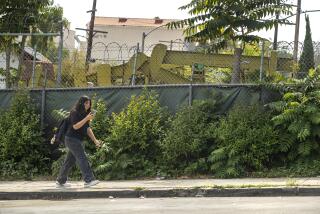House Rejects Last Attempt to Block Closure of Bases : Defense: With measure defeated on 343-75 vote, the military has less than two years to begin shutting down facilities.
- Share via
WASHINGTON — The 1995 round of military base closures, which pummeled California by targeting major installations in Long Beach and Sacramento, became official Friday when the House overwhelmingly rejected a last-ditch effort by some Californians and Texans to spare their bases by scrapping the entire list.
Almost half of California’s congressional delegation, 24 members, voted to throw out the recommendations of the base closure commission. In all, it will cost the state an estimated 19,372 civilian and military jobs, along with an additional 22,898 associated positions from related businesses that depend on bases for survival.
“Without question, these recommendations are bad for California, but they are bad for the military as well,” said Rep. Maxine Waters (D-Los Angeles), defending the Long Beach Naval Shipyard, which is to be closed. She also repeated contentions that the process was flawed, that the cost estimates were skewed and that the cuts are far too deep.
The dissenting legislators--who included Democrats and Republicans representing areas near the doomed bases--acknowledged that their effort to reject the list was a long shot, but they pressed ahead to point out the inequities and faulty judgments they said marred this round.
“I know that what I am engaging in here today is probably under the rubric of a primal scream,” said Rep. Vic Fazio (D-West Sacramento), who argued that California was hit far too hard by the cuts and that the decision to eliminate 14,000 jobs at Sacramento’s McClellan Air Force Base defied logic.
“Those who dodged the [commission’s] bullet are here to praise the commission and those who got hit are here to deride it,” he said.
With the 343-75 vote supporting the commission’s recommendations, the military now has two years from July 13, when President Clinton endorsed the list, to start closing bases. Within six years, it must complete the closures.
Not all Californians were complaining about the commission’s work.
Rep. Elton Gallegly (R-Simi Valley), who saw the Point Mugu Naval Warfare Center, Weapons Division, in Ventura County removed from the list in the final stretch, backed the panel’s recommendations, despite the effects on California.
“To keep a base alive when it has no strategic necessity is not the right thing to do,” Gallegly said in an interview. “The bases that could not stand on their own are on that list.”
The effort to overturn the base closure commission’s work was organized by Rep. Frank Tejeda (D-Tex.), who joined many of his Texas colleagues in arguing that the closure of Kelly Air Force in San Antonio would devastate the local economy, especially the largely Latino work force, and hurt the country’s military readiness.
The “commission has cut through the muscle and right into the bone and muscle of the Air Force,” he said.
Others decried the political atmosphere that clouded the list when Clinton angrily criticized the commission’s recommendations to close Kelly and McClellan over the Pentagon’s objections and directed the Air Force to develop a privatization plan to enable Sacramento and San Antonio to keep many of the jobs that might otherwise be lost.
Both the House and Senate would have had to vote to overturn the recommendations by Sept. 15 for them to have become voided. There are no plans to mount a challenge in the Senate, and with Friday’s House vote, the recommendations will take effect, said the panel’s spokesman, Wade Nelson.
More to Read
Get the L.A. Times Politics newsletter
Deeply reported insights into legislation, politics and policy from Sacramento, Washington and beyond. In your inbox three times per week.
You may occasionally receive promotional content from the Los Angeles Times.










